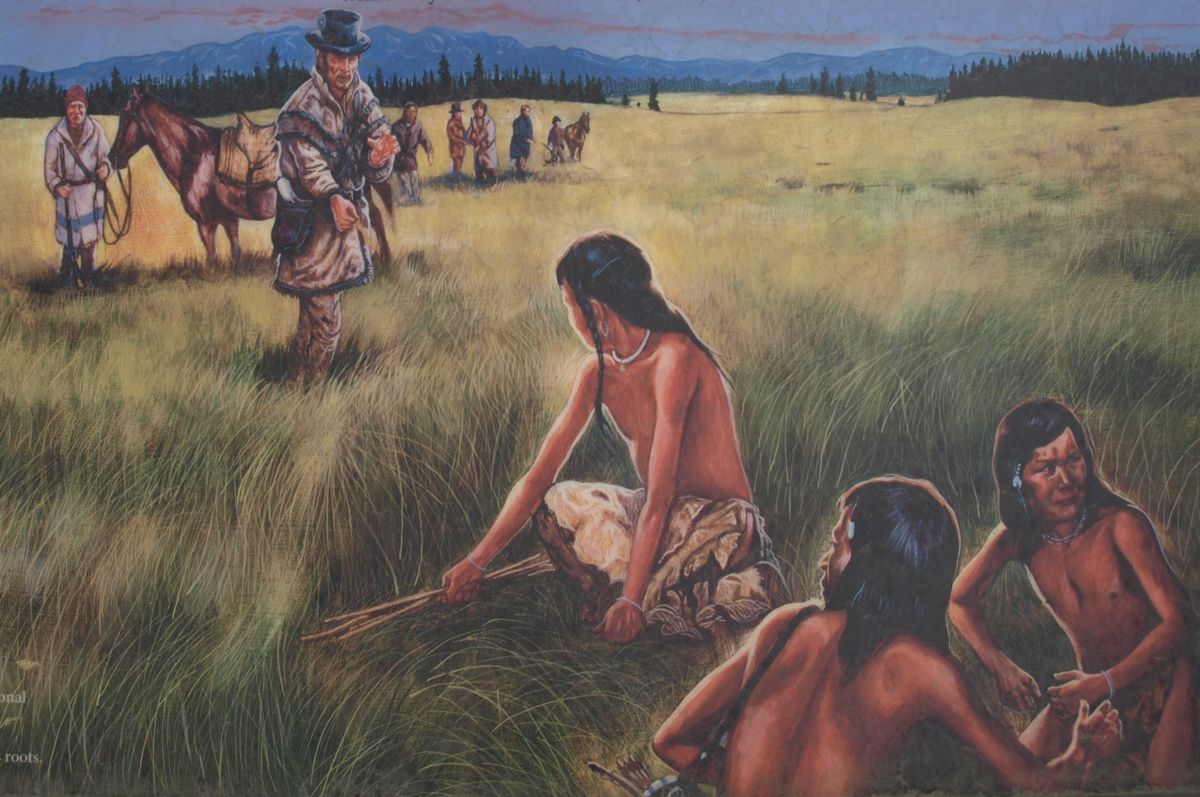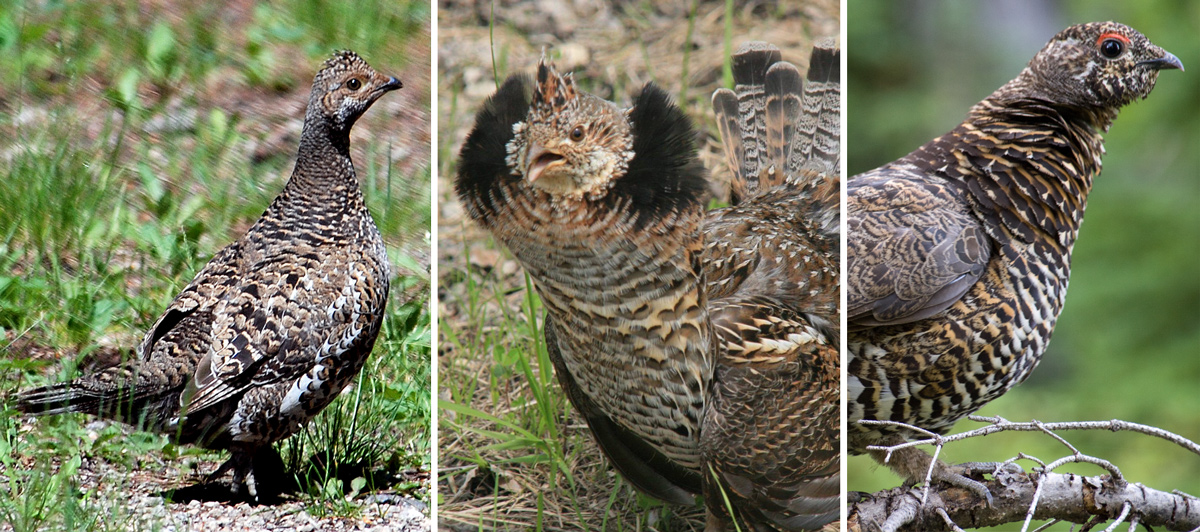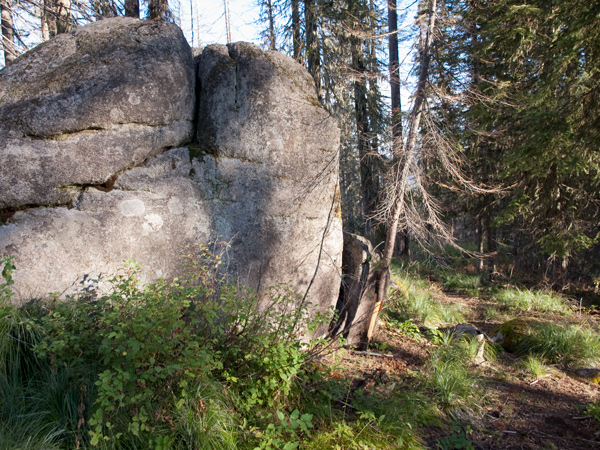Clark’s advance party reaches the Weippe Prairie Villages where Nez Perce women are gathering and baking camas bulbs. They offer the hungry men dried salmon and roots.
Many miles behind Clark, Lewis and the main party get their fill of the horse meat left by Clark yesterday. One of the pack horses wonders away with his load, and Pvt. Lepage is sent to find it. They camp on a small divide between Hungery Creek and the Lolo Creek (Idaho) drainage.
The Nez Perce
by Yellowstone Public Radio[1]Originally aired weekdays by Yellowstone Public Radio during the Bicentennial observance of 2003-2006. Narrated by Hal Hansen. Scripts by Whit Hansen and Ed Jacobson. Produced by Leni Holliman. © … Continue reading
Clark: Weippe Prairie Villages
First Village
decended the mountain to a leavel pine Countrey proceeded on through a butifull Countrey for three miles to a Small Plain in which I found maney Indian lodges, at the distance of 1 mile from the lodges I met 3 boys . . . . gave them Small pieces of ribin & Sent them forward to the village
—William Clark
Second Village
proceeded on with a Chief to this Village 2 miles in the Same Plain, where we were treated kindly in their way and continued with them all night . . . . They call themselves Cho pun-nish or Pierced Noses; their dialect appears verry different from the Tushapaws altho origneally the Same people
—William Clark
Camas
Emence quantity of the quawmash or Pas-shi-co root gathered & in piles about the plains . . . . I find myself verry unwell all the evening from eateing the fish & roots too freely.
—William Clark
Lewis: Horse Steaks
Hungry Morning
a cold frosty morning we found a handful or 2 of Indian peas and a little bears oil which we brought with us we finished the last morcil of it and proceeded on half Starved and very weak
—Meriwether Lewis
Three Species of Grouse
Blue Grouse | Ruffed Grouse | Spruce Grouse
Blue Grouse: Provided by S. King of the U.S. National Park Service.
Oregon Ruffed Grouse: Courtesy U.S. Fish and Wildlife Service.
Spruce Grouse: Moon Saddle, Lolo Trail, 11 September 2009. © Kristopher K. Townsend.
Three species of Pheasants, a large black species, with some white feathers irregularly scattered on the brest neck and belley a smaller kind of a dark uniform colour with a red stripe above the eye, and a brown and yellow and a brown and yellow species that a good deel resembles the phesant common to the Atlantic States.
—Meriwether Lewis
Horsesteak Meadow
we came to a small glade, where our hunters had found a horse, and had killed, dressed and hung him up. Capt. Clarke, who had gone forward with the hunters, left a note informing us that he and they intended to go on to the valley or level country ahead, as there was no chance of killing any game in these desert mountains.
—Meriwether Lewis
Searching for Baggage
I larnt that one of the Packhorses with his load was missing and immediately dispatched Baptiest Lapage [Jean-Baptiste Lepage] who had charge of him, to surch for him. he returned at 3 OC. without the horse. The load of the horse was of considerable value consisting of merchandize and all my stock of winter cloathing. I therefore dispatched two of my best woodsmen in surch of him
—Meriwether Lewis
“grey free stone”
Between Hungery and Dollar Creeks
© 10 September 2010 by Kristopher K. Townsend. Permission to use granted under the Creative Commons Attribution-Share Alike 4.0 International license.
Gray Free Stone
the land through which we passed this evening is of an excellent quality tho very broken, it is a dary grey soil. a grey free stone appearing in large masses above the earth in many places.
—Meriwether Lewis
Full Stomach Camp
our road was much obstructed by fallen timber particularly in the evening we encamped on a ridge where ther was but little grass for our horses, and at a distance from water. however we obtained as much as served our culinary purposes and suped on our beef.
—Meriwether Lewis
Weather Diary
Weather at rise
Wind at rise
Weather at 4 P.M. Wind at 4 P.M. fair S W fair S W. I found a horse had him killed & hung up for the party behind
—Meriwether Lewis and William Clark[2]To assist the reader, the editor of this web page has omitted the date column and spelled out some abbreviations.
Weippe Prairie is a High Potential Historic Site along the Lewis and Clark National Historic Trail managed by the U.S. National Park Service. A 274-acre tract in the prairie is managed by the Nez Perce National Historic Park.
Notes
| ↑1 | Originally aired weekdays by Yellowstone Public Radio during the Bicentennial observance of 2003-2006. Narrated by Hal Hansen. Scripts by Whit Hansen and Ed Jacobson. Produced by Leni Holliman. © 2003 by Yellowstone Public Radio. |
|---|---|
| ↑2 | To assist the reader, the editor of this web page has omitted the date column and spelled out some abbreviations. |
Experience the Lewis and Clark Trail
The Lewis and Clark Trail Experience—our sister site at lewisandclark.travel—connects the world to people and places on the Lewis and Clark Trail.
Discover More
- The Lewis and Clark Expedition: Day by Day by Gary E. Moulton (University of Nebraska Press, 2018). The story in prose, 14 May 1804–23 September 1806.
- The Lewis and Clark Journals: An American Epic of Discovery (abridged) by Gary E. Moulton (University of Nebraska Press, 2003). Selected journal excerpts, 14 May 1804–23 September 1806.
- The Lewis and Clark Journals. by Gary E. Moulton (University of Nebraska Press, 1983–2001). The complete story in 13 volumes.






